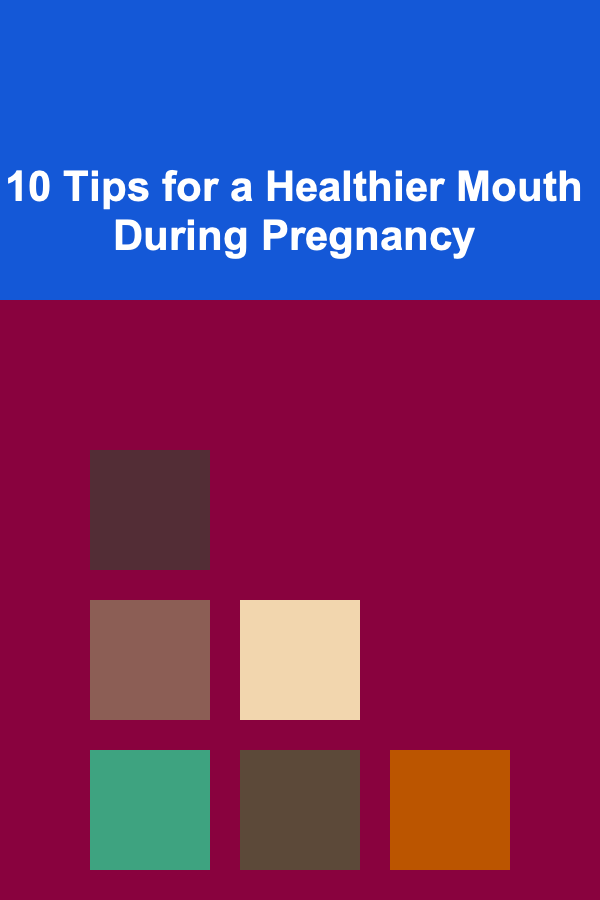
10 Tips for a Healthier Mouth During Pregnancy
ebook include PDF & Audio bundle (Micro Guide)
$12.99$9.99
Limited Time Offer! Order within the next:

Pregnancy is a beautiful and transformative experience, but it also comes with its own set of challenges and responsibilities. One aspect that often gets overlooked is oral health. During pregnancy, hormonal changes can significantly impact the condition of your teeth and gums, making it essential to maintain proper dental hygiene to prevent common issues like gum disease, tooth decay, and other oral health problems.
Maintaining a healthy mouth not only protects your teeth and gums but also contributes to your overall well-being and the health of your baby. In this article, we will explore 10 essential tips for a healthier mouth during pregnancy, covering everything from basic oral hygiene practices to preventive care.
Brush and Floss Regularly
The foundation of any good oral care routine is consistent brushing and flossing. Pregnancy can sometimes cause changes in your oral health, including increased plaque buildup and swollen gums. To combat these changes, make sure you brush your teeth at least twice a day and floss at least once a day.
Tips for Brushing:
- Choose a Soft-Bristled Toothbrush: A soft-bristled toothbrush is gentle on your gums and enamel, reducing irritation and the risk of injury.
- Use Fluoride Toothpaste: Fluoride toothpaste helps prevent tooth decay by strengthening tooth enamel and reducing the buildup of harmful bacteria.
- Brush for Two Minutes: Aim to brush your teeth for two minutes each time to ensure that all areas of your mouth are thoroughly cleaned.
Tips for Flossing:
- Be Gentle: Floss gently to avoid causing damage to your gums. Pregnancy-related gum changes can make your gums more sensitive.
- Don't Skip It: Flossing is important to remove plaque and food particles from areas that your toothbrush cannot reach.
Why It Works:
Brushing and flossing remove food particles, plaque, and bacteria that can contribute to tooth decay and gum disease. During pregnancy, your body's hormonal changes can make your gums more sensitive, so maintaining a consistent cleaning routine is especially important.
Visit the Dentist Regularly
Regular dental checkups are vital during pregnancy. Many women delay or avoid dental visits out of fear that it may harm their baby. However, it is safe to visit your dentist during pregnancy, and it's even more important to get checked for any oral health problems. A visit to the dentist every six months (or more often if advised by your dentist) can help prevent issues before they become serious.
Why It Works:
Routine dental visits allow your dentist to detect early signs of tooth decay, gum disease, or other issues that could worsen over time. If you're experiencing pregnancy-related gum problems like gingivitis, your dentist can provide treatment and guidance.
Manage Morning Sickness Carefully
Morning sickness, which affects many pregnant women, can cause nausea and vomiting, making it difficult to maintain a healthy mouth. Frequent vomiting exposes your teeth to stomach acid, which can erode tooth enamel over time.
Tips for Dealing with Morning Sickness:
- Rinse Your Mouth with Water: After vomiting, rinse your mouth with water or a fluoride mouthwash to help neutralize the acid. Avoid brushing immediately, as this can further damage the enamel.
- Eat Small, Frequent Meals: Eating small meals throughout the day can help reduce nausea and limit the effects of morning sickness.
- Chew Sugar-Free Gum: Chewing sugar-free gum after meals can help increase saliva production, which helps neutralize acids in your mouth.
Why It Works:
Taking these precautions can help protect your teeth from acid erosion caused by morning sickness. Rinsing with water or mouthwash helps dilute the acid, while avoiding brushing too soon prevents unnecessary enamel wear.
Watch Your Diet
What you eat plays a crucial role in maintaining healthy teeth and gums during pregnancy. A balanced diet rich in vitamins and minerals is essential for your overall health, including oral health. Certain foods can promote healthy teeth and gums, while others can contribute to plaque buildup and tooth decay.
Tips for a Healthy Diet:
- Eat More Fruits and Vegetables: Fresh fruits and vegetables, especially those high in fiber, can help clean your teeth naturally and stimulate saliva production, which protects your enamel.
- Choose Dairy Products: Dairy products like milk, cheese, and yogurt are rich in calcium and vitamin D, both of which are essential for strong teeth.
- Limit Sugary Foods: Sugary foods and drinks contribute to plaque buildup and increase the risk of cavities. Try to avoid sweets, soda, and sticky snacks.
- Hydrate with Water: Drinking plenty of water throughout the day helps rinse away food particles and keeps your mouth hydrated, promoting saliva production.
Why It Works:
A nutritious diet provides the necessary nutrients for maintaining strong teeth and healthy gums. By focusing on whole foods and limiting sugar, you can reduce your risk of tooth decay and gum disease during pregnancy.
Use Mouthwash for Extra Protection
Mouthwash can be an effective way to add an extra layer of protection against bacteria and plaque buildup. Look for a mouthwash that contains fluoride and is alcohol-free, as alcohol can dry out your mouth and irritate your gums.
Why It Works:
Mouthwash helps reach areas that brushing and flossing may miss. It also reduces bacteria in your mouth, preventing gum disease and cavities. Fluoride mouthwash strengthens enamel, making it more resistant to decay.
Treat Pregnancy Gingivitis
Pregnancy gingivitis is a common condition caused by hormonal changes during pregnancy. It results in swollen, red, and bleeding gums, especially when brushing and flossing. If left untreated, it can progress into more severe gum disease, which can lead to tooth loss.
Tips for Managing Gingivitis:
- Brush Gently: Be gentle when brushing your teeth to avoid further irritating your gums.
- Use a Soft-Bristled Toothbrush: A soft-bristled toothbrush will help protect your gums from becoming inflamed.
- Avoid Smoking: Smoking can worsen gum disease and increase your risk of complications, so avoid tobacco products.
Why It Works:
Treating pregnancy gingivitis early can prevent it from progressing into more severe forms of gum disease. Maintaining proper oral hygiene and seeking dental treatment can keep your gums healthy throughout pregnancy.
Avoid Harmful Habits Like Smoking
Smoking during pregnancy is harmful to both your health and the health of your baby. It can negatively impact your oral health, increasing the risk of gum disease, tooth decay, and even oral cancer.
Why It Works:
Smoking weakens your immune system and makes it harder for your body to fight off infections, including gum disease. Quitting smoking during pregnancy can reduce these risks and improve your overall oral health.
Avoid Excessive Snacking
Frequent snacking, especially on sugary or acidic foods, can contribute to plaque buildup and increase your risk of cavities. Snacking throughout the day keeps your mouth in a constant state of acid attack, which can erode enamel.
Tips for Reducing Snacking:
- Stick to Regular Meals: Instead of snacking frequently, aim to eat three balanced meals a day.
- Choose Healthy Snacks: If you do need a snack, opt for healthy choices like nuts, cheese, or raw veggies that are less likely to cause tooth decay.
- Drink Water Between Meals: Water helps rinse away food particles and neutralizes acids in your mouth.
Why It Works:
Limiting snacks and making healthier choices helps reduce the risk of cavities and plaque buildup. Your teeth and gums will benefit from less frequent acid exposure.
Take Prenatal Vitamins
Prenatal vitamins are essential during pregnancy to ensure you get the nutrients needed for a healthy pregnancy and baby. These vitamins can also support your oral health, particularly calcium and vitamin D, which are important for maintaining strong teeth.
Why It Works:
Prenatal vitamins provide the essential nutrients that your body needs to maintain your overall health, including the health of your teeth and gums. Calcium and vitamin D play a significant role in preventing tooth decay and strengthening enamel.
Don't Skip Your Postpartum Dental Checkup
After giving birth, your body undergoes additional changes, and your oral health may require extra attention. It's essential to continue caring for your teeth and gums after pregnancy to ensure that you maintain a healthy mouth.
Why It Works:
Postpartum dental checkups allow your dentist to assess any oral health issues that may have developed during pregnancy, such as gum disease or tooth decay. They can provide treatment and help you maintain a healthy smile for years to come.
Conclusion
Oral health during pregnancy is a crucial but often overlooked aspect of prenatal care. Hormonal changes can make your gums more sensitive, and other factors like morning sickness and snacking can contribute to oral health issues. However, with the right care and attention, you can maintain a healthy mouth throughout your pregnancy.
By following these 10 tips---brushing and flossing regularly, visiting the dentist, managing morning sickness, eating a balanced diet, using mouthwash, treating gingivitis, quitting harmful habits, reducing snacking, taking prenatal vitamins, and keeping up with postpartum checkups---you can protect your oral health and ensure a healthy pregnancy for both you and your baby.
Taking care of your teeth and gums during pregnancy isn't just about preventing cavities; it's about fostering overall health, feeling confident, and ensuring your well-being during this exciting chapter of your life.
Reading More From Our Other Websites
- [Home Soundproofing 101] How to Soundproof Your Home on a Tight Budget
- [Personal Financial Planning 101] How to Build a Personal Budget That Works for Your Lifestyle
- [Organization Tip 101] How to Choose the Right Appliances for Your Outdoor Kitchen
- [Personal Financial Planning 101] How to Begin Understanding Mutual Funds and Their Role in Diversifying Your Portfolio
- [Mindful Eating Tip 101] Mindful Eating for Seniors with Dietary Restrictions: Balancing Flavor and Health
- [Home Holiday Decoration 101] How to Create a Budget-Friendly Holiday Decor Plan for Your Entire Home
- [Organization Tip 101] How to Build a Family Reunion Committee for Effective Planning
- [Home Budget Decorating 101] How to Choose and Style Affordable Throw Pillows for Your Sofa
- [Personal Care Tips 101] How to Use Mouthwash Effectively for Fresh Breath and Oral Health
- [Home Pet Care 101] How to Keep Your Home Clean and Pet-Friendly: A Guide to Safe Cleaning Products

DIY Car Wash and Detailing: Tips and Tricks for a Showroom Shine at Home
Read More
How to Clean and Maintain Your Home's Windows for Better Efficiency
Read More
How to Decorate Your Home for the Holidays with Minimalism in Mind
Read More
How to Set Financial Goals for Smart Personal Investment
Read More
How to Use DIY Garland to Add Festivity to Any Room
Read More
How to Edit Food Photography for Instagram
Read MoreOther Products

DIY Car Wash and Detailing: Tips and Tricks for a Showroom Shine at Home
Read More
How to Clean and Maintain Your Home's Windows for Better Efficiency
Read More
How to Decorate Your Home for the Holidays with Minimalism in Mind
Read More
How to Set Financial Goals for Smart Personal Investment
Read More
How to Use DIY Garland to Add Festivity to Any Room
Read More